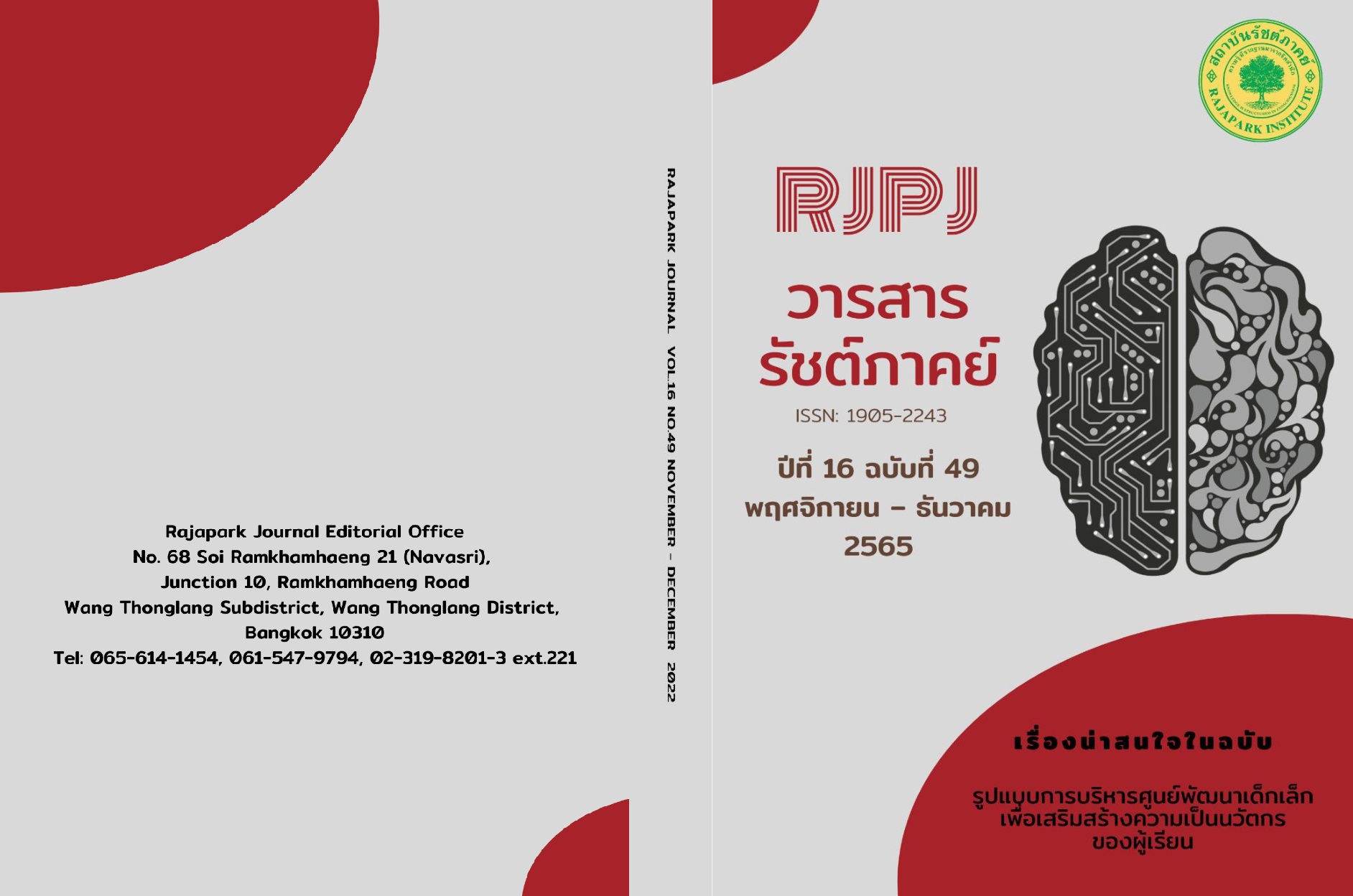Causal Factors and Effect of Coaching Behavior of Branch Managers in Banking Business
Main Article Content
Abstract
The purpose of this study was to investigate the validity of the causal relation model of coaching behavior in the banking business. The sample consisted of 663 branch managers within the banking business in Thailand, and they were selected by stratified random sampling from branch managers of banks listed in the Top 100 of banking on the Stock Exchange of Thailand. Data was collected through a questionnaire with five factors considered: emotional intelligence, transformational leadership, trust building, coaching behavior, and self-esteem. Those data were analyzed by utilizing a structural equation model (SEM). Results indicated that the structural model was consistent with empirical data. Results indicated that the structural model was consistent with empirical data by a percentage of 67.8, with the variances associated with coaching behavior explained by emotional intelligence, transformational leadership, and trust building. Specifically, transformational leaders had the strongest direct effect on the coaching behavior of branch managers by a percentage of 78.3. Results indicated that the structural model was consistent with empirical data by a percentage of 95.55, with the variances associated with self-esteem explained by emotional intelligence, transformational leadership, trust building, and coaching behavior.
Article Details

This work is licensed under a Creative Commons Attribution-NonCommercial-NoDerivatives 4.0 International License.
Views and opinions appearing in the Journal it is the responsibility of the author of the article, and does not constitute the view and responsibility of the editorial team.
References
Bank of Thailand. (2021) Summary of the number of branches and service points of commercial
Banks. Bank of Thailand. https://www.bot.or.th/App/BTWS_STAT/statistics/ReportPage.
aspx?reportID=904&language=th
Bass, B.M., & Avolio, B.J. (1994). Improving Organization Effectiveness Through Transformational
Leadership. SAGE Publications.
Bass, B.M., & Riggio R.E. (2006). Transformational leadership (2nd ed.). Associates Publishers.
Berg, M., & Karlsen, J. (2016). A study of coaching leadership style practice in projects.
Management Research Review. 39(9), 1122-1142.
Blanchard, K., Olmstead, C., & Lawrence, M. (2013). Trust Works: Four Keys to Building Lasting
Relationships. Harper Collins Publishers.
Bloom, G.S., Castagna, C.L., Moir, E.R., & Warren, B. (2005). Blended Coaching: Skills and
Strategies to Support Principal Development. Corwin Press.
Castelli, P.A. (2008), The leader as motivator: coach and self‐esteem builder. Management
Research News, 31(10), 717-728.
Chapman, M. (2005). Emotional intelligence and coaching: an exploratory study, In Cavanagh, M.,
Grant, A.M., & Kemp, T. (Eds), Evidence-based Coaching (Vol. 1): Theory, Research and
Practice from the Behavioural Sciences, Australian Academic Press.
Cidral, W., Berg, C. H., & Paulino, M. L. (2021). Determinants of coaching success: a systematic
review. International Journal of Productivity and Performance Management,
https://doi.org/10.1108/IJPPM-07-2020-0367
Cooper, R.K., & Sawaf, A. (1997). Executive EQ: Emotional Intelligence in Business. Orion Business
Books.
Coopersmith, S. (1984). SEI: Self Esteem Inventories. (2nd ed.). Consulting Psychologist Press.
Cox, E., Bachkirova, T., & Clutterbuck, D. (2014). The Complete Handbook of Coaching (2nd ed.).
SAGE Publications.
Goleman, D. (2006). Social Intelligence: The New Science of Social Relationships. Bantam Books.
Hair, Jr., J.F., Black, W.C., Babin, B.J., & Anderson, R.E. (2010). Multivariate Data Analysis: A
Global Perspective (7th ed). Pearson Education.
International Coaching Federation (ICF). (2021). ICF Core Competencies. ICF.
https://coachingfederation.org/app/uploads/2021/02/Current-ICF-Core-Competencies.pdf
Juicharern, A. (2015). Leader as Coach. Accomm and Image.
Kim, S.H., Bang W.S., & Wee, K.H. (2020). Effect Relationships among Coaching Leadership, Job
Satisfaction, Trust, and Organizational Loyalty. Asia-pacific Journal of Convergent Research
Interchange, 6(7), 115-124.
Lolak, K. (2018). The Positive Leader. Be Management.
Mayer, J.D., & Salovey, P. (1997). What is Emotional Intelligence? In Emotional Development
and Emotional Intelligence: Education Implication. Basis Book.
Mayer, R.C., Davis. J.H., & Schoorman F.D. (1995). An Integrative Model of Organizational Trust.
The Academy of Management Review, 20(3), 709-734.
McKee, A., Tilin, F., & Mason, D., (2009). Coaching from the inside: Building an internal group of
Emotionally intelligent coaches. International Coaching Psychology Review, 4(1) 59-70.
Niratpattanasai, K., Cousin J.F., Seebungkerd, P., & Pimolsaengsuriya, A. (2012). Untold Stories
of Executive Coaching in Thailand. Bangkokbiznews.
Puttanont, W. (2022, June 4). Speed up for Banking Business to New Normal. The Bangkok
insight. http://www.thebangkokinsight.com/news/business/370964/
Roongsangjun, T. (2016). Approach of the Thai Labour Movement Towards 21st Century
Globalization. Journal of Social Work, 24(2), 104-105.
Sharkie, R. (2009). Trust in Leadership is Vital for Employee Performance. Management Research
News, 32(5), 491-498.
Sosik, J.J., & Jung, D.I. (2010), Full Range Leadership Development: Pathways for People, Profit
and Planet. Routledge.
Srisatitnarakoon, B. (2012). Development and Validation of Research Instruments: Psychometric
Properties. Chulalongkorn University.
Starcevich, M.M. (2022). Coaching Behaviors of Transformational Leaders. Coaching & Mentoring.
http://www.coachingandmentoring.com/behaviors-of-transformational-leaders/
Sun, Y., Gergen, E., Avila, M., & Green, M. (2016). Leadership and Job Satisfaction: Implications
for Leaders of Accountants. American Journal of Industrial and Business Management,
(3), 268-275.
Thelwell, R.C., Lane, A.M., Weston, N.J.V., & Greenlees, I.A. (2008). Examining Relationships
Between Emotional Intelligence and Coaching Efficacy. West Virginia University
The Ken Blanchard Companies. (2017). Coaching Skills: The Missing Link for Leaders. The Ken
Blanchard Companies. https://www.blanchardcolombia.com/coaching-skills-the-missing- link-for-leaders.pdf
The Stock Exchange of Thailand. (2021, Dec 17). SET50 & SET100 Index Constituents.
https://www.lhsec.co.th/uploads/userfiles/files/2022/SET50_H1_2022.pdf
Wang, Q., Lai, Y-L., Xu, X., & McDowall, A. (2022). The Effectiveness of Workplace Coaching: A
Meta-analysis of Contemporary Psychologically Informed Coaching Approaches. Journal of
Work-Applied Management. 14, 77-101. DOI: 10.1108/JWAM-04-2021-0030.
Whitmore, J. (2009). Coaching for Performance (Wuttinun). Arrow Multimedia.
Wongyai, W., & Patphol, M. (2014). Cognitive Coaching (5th ed.). Charansanitwong Press.


